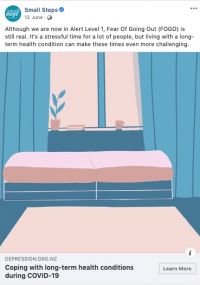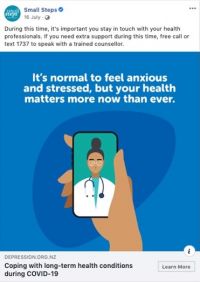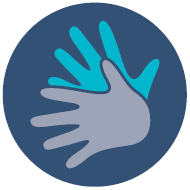Supporting people who are living with health conditions, particularly people more vulnerable to COVID-19.
The project was supported by a range of organisations including Arthritis New Zealand, Diabetes New Zealand, the Stroke Foundation, Alzheimers New Zealand, Hāpai Te Hauora, Cancer Society, and the Mental Health Foundation.
We worked with health providers, including GPs, and took the experiences of those living with long-term health conditions to develop a suite of key messages and to inform the overall approach.
Partnering with regional and community groups
Our community partners (and a brief description of their projects) are detailed below.
- Stroke Foundation. Life After Stroke: Managing Depression, Anxiety and Career Stress
- Through this project new tools (videos, information sheets, webinars and face-to-face seminars) will be developed to meet needs of stroke survivors and their whānau, friends and carers coping with depression/anxiety after stroke.
- View the resources.
- Te Hau Ora o Ngāpuhi Ltd. Kaimanaaki Iwi Service
- This initiative will encourage whānau members with long-term health conditions to access healthcare and health information in a timely manner that meets their needs.
- Note, this project is in association with our Māori team.
- Cystic Fibrosis Association of New Zealand. Supported Achievement of Personal Physical Activity Goals
- Our aim is to encourage people with cystic fibrosis to become more physically active using an online exercise platform.
- Our aim is to encourage people with cystic fibrosis to become more physically active using an online exercise platform.
- Asian Family Services. Reach Out
- We will develop video resources for Chinese, Korean and South Asian older people, people with long-term conditions of injury, illness or health condition, pregnant women and new mothers.
- The Asian Helpline will support the audiences to access reliable information on what support is available in their communities.
- View the videos.
- Youthline Auckland Charitable Trust. Supporting young people with health conditions
- This project will support people with long-term health conditions, by providing free counselling and support services.
- Youthline is also upskilling staff on their health literacy so that they have the appropriate knowledge to support this vulnerable group.
- Goodfellow Unit – University of Auckland. Work, Love, Play
- We will develop a webinar for GPs and nurses on solutions to Covid-related issues of sleep, stress and pain and a podcast on the same topic with Prof Bruce Arroll.
- In addition, videos (up to 10-minutes long) will be made for health coaches to be used with their patients.
- Mind and Body. Rethink: Work conversations
- We will provide lived experience informed resources that will prompt people to raise the conversation with their GP or health care professional and to get additional employment support.
- We will provide lived experience informed resources that will prompt people to raise the conversation with their GP or health care professional and to get additional employment support.
- Te Awakairangi Health Network. Reconnecting People and Whānau to Primary Care
- There is a concern that people are not seeking health care in a timely way. In fact, they are avoiding or delaying seeking care.
- The project addresses this concern by developing a mixed media campaign with a series of short videos showing common situations for whānau having difficulties accessing care, and showing how they can get the healthcare they need.
- Note, this project is relevant to all the audiences Te Hiringa Hauora is focusing on.
- View the videos and resource.
NewsHub interview and article
Social media


Getting Through Together - Digital (animated) ads
Te Hiringa Hauora web pages
A page on depression.org.nz was designed to meet the needs of people with long-term health conditions.
Sign language videos
Te Hiringa Hauora partnered with Eyefilm Studios to develop a suite of wellbeing messages for the deaf community. These messages support deaf people with long-term health conditions to take care of their wellbeing through COVID-19 as well as providing tips for GPs to engage with deaf people’s needs and culture.



